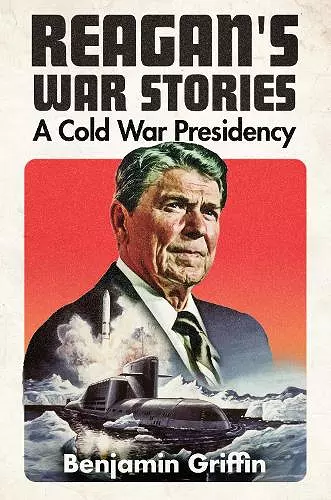Reagan's War Stories
A Cold War Presidency
Format:Hardback
Publisher:Naval Institute Press
Published:15th Sep '22
Currently unavailable, our supplier has not provided us a restock date

Reagan's War Stories examines the relationship between Ronald Reagan, the public and popular culture. From an overview of Reagan's youth and the pulp fiction he consumed, we get a sense of the future president's good/evil outlook. Carrying that over into Reagan's reading and choices as president, Griffin situates narrative at the center of Reagan's political formation and leadership providing a compelling account of both Reagan's life, his presidency, and a lens into non-traditional strategy formulation.
Author Ben Griffin tells three stories about an American president who ushered in the end of the Cold War. A survey of Reagan's youth and the fiction he consumed and created as an announcer and actor, reveals how the future president's worldview developed. A look at the rise of fiction and popular culture rife with pro-Americanism in the 1980s details a uniquely symbiotic relationship between the chief executive and popular culture in framing the Cold War as a struggle with an "Evil Empire" in the Soviet Union. Finally, Griffin outlines how presidential personality and reading preferences shaped President Reagan's pursuit of the "Star Wars" initiative and belief in the transformative combination of freedom and technology.
Griffin demonstrates that novels by Tom Clancy, Louis L'Amour, and science fiction influenced Reagan's view of 1980s geopolitics. His identification with fiction led Ronald Reagan to view European Cold War issues with more empathy but harmed the president's policymaking when the narrowness of his reading led him to apply a white-hat/black-hat framework that did not match the reality of conflict in Latin America.
Reagan treated fictional portrayals seriously, believing they shaped public views and offered valid ways to think through geo-political issues. Seeking to shape the reading habits of the public, his administration sought to highlight authors who shared his worldview like Tom Clancy, Louis L'Amour, and Allen Drury over other popular writers like Robert Ludlum and John Le Carre who portrayed the Cold War in less stark moral terms. The administration's favored popular authors in turn intentionally incorporated Reagan-era policies into their work to advocate for them through fiction, thus reaching a broader audience than via official government releases and speeches.
Showing how Reagan used narrative as both a consumer and a communicator, Griffin notes that...
“Highly engaging and thought-provoking, Griffin has put together an insightful book that leaves the reader with an improved understanding of pop culture’s impact on Reagan in not only leading the nation through the Cold War, but in the totality of his life as well.”—The Strategy Bridge
ISBN: 9781682477786
Dimensions: unknown
Weight: 489g
248 pages